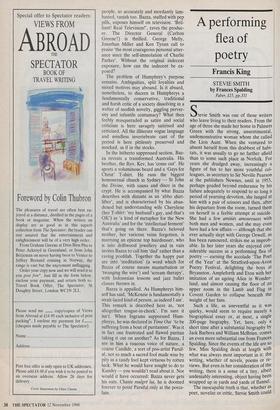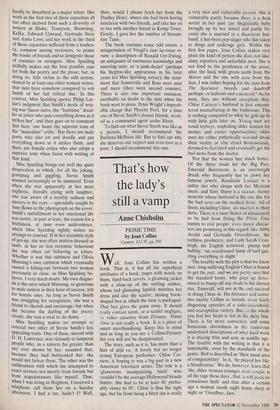A performing flea of poetry
Francis King
STE VIE SMITH by Frances Spalding
Faber, £15, pp.33I
Stevie Smith was one of those writers who leave living to their readers. From the age of three she made her home in Palmers Green with the strong, unsentimental, undemonstrative woman whom she called the Lion Aunt. When she ventured to absent herself from this drabbest of habi- tats, it was usually to go no farther afield than to some such place as Norfolk. For years she drudged away, increasingly a figure of fun to her more youthful col- leagues, as secretary to Sir Neville Pearson at the publishers Newnes, until in 1953, perhaps goaded beyond endurance by his failure adequately to respond to so long a period of yearning devotion, she lunged at him with a pair of scissors and then, after his departure from the room, turned them on herself in a feeble attempt at suicide. She had a few amities amoureuses with both men and women, and she may even have had a few affairs — although that she ever actually slept with George Orwell, as has been rumoured, strikes me as improb- able. In her later years she enjoyed con- siderable success as a performing flea of poetry — earning the accolade 'The Poet of the Year' at the Stratford-upon-Avon Poetry Festival, delighting the boys at Bryanston, Ampleforth and Eton with her imitation of an ageing Alice in Wonder- land, and almost causing the floor of an upper room in the Lamb and Flag in Covent Garden to collapse beneath the weight of her fans.
Such a life, as uneventful as it was quirky, would seem to require merely a biographical essay or, at most, a single 200-page biography. Yet, here, only a short time after a substantial biography by Jack Barbera and William McBrien, conies an even more substantial one from Frances Spalding. Since the events of the life are so few, Miss Spalding deals at length with what was always most important in it: the writing, whether of novels, poems or re- views. But even in her consideration of the writing, there is a sense of a tiny, albeit undeniably interesting, object having been wrapped up in yards and yards of flannel. The inescapable truth is that, whether as poet, novelist or critic, Stevie Smith could hardly be described as a major talent. Her work in the first two of these capacities all too often derived from such a diversity of writers as Blake, Tennyson, Browning, Kafka, Edward Upward, Gertrude Stein and Anita Loos; and her work in the third of these capacities suffered from a tenden- cy, common among reviewers, to praise the books of friends and to denigrate those of enemies or strangers. Miss Spalding skilfully makes out the best possible case for both the poetry and the prose; but, in doing so, falls victim to the odd notion, shared by at least one other woman writer, that men have somehow conspired to rob Smith of her full critical due. In this context, Miss Spalding quotes Philip Lar- kin's judgment that Smith's mode of writ- ing was lausse naive, the "feminine" dood- ler or jotter who puts everything down as it strikes her', and then goes on to comment that here 'one hears the superior tone of the "masculine" critic.' But there are male Poets who also jot and doodle and put everything down as it strikes them, and there are female critics who also adopt a superior tone when faced with writing of that kind.
Miss Spalding brings out well the quiet desperation in which, for all the joking, gossiping and giggling, Stevie Smith seemed increasingly to be immured. Even When she was apparently at her most euphoric, literally crying with laughter, one was aware of a terrible sadness and anxiety in the eyes — splendidly caught by Jane Bown in the photograph on the cover. Smith's unfulfilment in her emotional life was surely, in part at least, the reason for a bitchiness, at time even malevolence, Which Miss Spalding rightly makes no attempt to conceal. If in her eccentric style of get-up, she was often mutton dressed as lamb, in her no less eccentric behaviour she was often cat behaving as kitten. Whether it was this cattiness and Olivia Manning's own cattiness which eventually caused a falling-out between two women Previously so close, as Miss Spalding be- lieves, I very much doubt. My own diagno- sis is the envy which Manning, so generous to male writers in their hour of success, felt for female ones. As long as Stevie Smith was struggling for recognition, she was a friend to cherish and encourage; but when She became the darling of the poetry circuit, she was a rival to do down.
Miss Spalding makes no attempt to conceal two other of Stevie Smith's less appealing traits. One of these, shared with D. H. Lawrence, was viciously to lampoon People who, in a naivete far greater than any ever shown by her, assumed that, because they had befriended her, she would not betray them. The other was the ruthlessness with which she attempted to exact services not merely from friends but from acquaintances like myself. Thus, When I was living in Brighton, I received a telephone call from her on a Sunday afternoon. I had a car, hadn't I? Well, then, would I please fetch her from the Dudley Hotel, where she had been having luncheon with two friends, and take her on to tea with another friend in Kemp Town. Firmly, I gave her the number of Stream- line Taxis.
The book contains some odd errors: a misquotation of Vergil's iunt lacrimae re- rum; a description of Ronald Orr-Ewing, an antiquaire of enormous knowledge and unerring taste, as 'a junk-dealer' (perhaps his Steptoe-like appearance in his later years led Miss Spalding astray); the state- ment that Somerville and Ross were aunt and niece (they were second cousins). There is also one important omission, ascribable no doubt to the date when the book went to press: Peter Wright's improb- able charge that Phoebe Pool, for a time one of Stevie Smith's closest friends, work- ed as a communist agent under Blunt.
To find out what Stevie Smith was like as a person, I should recommend the Barbera-McBrien life. But to find out why she deserves our respect and even love as a poet, I should recommend this one.











































































 Previous page
Previous page